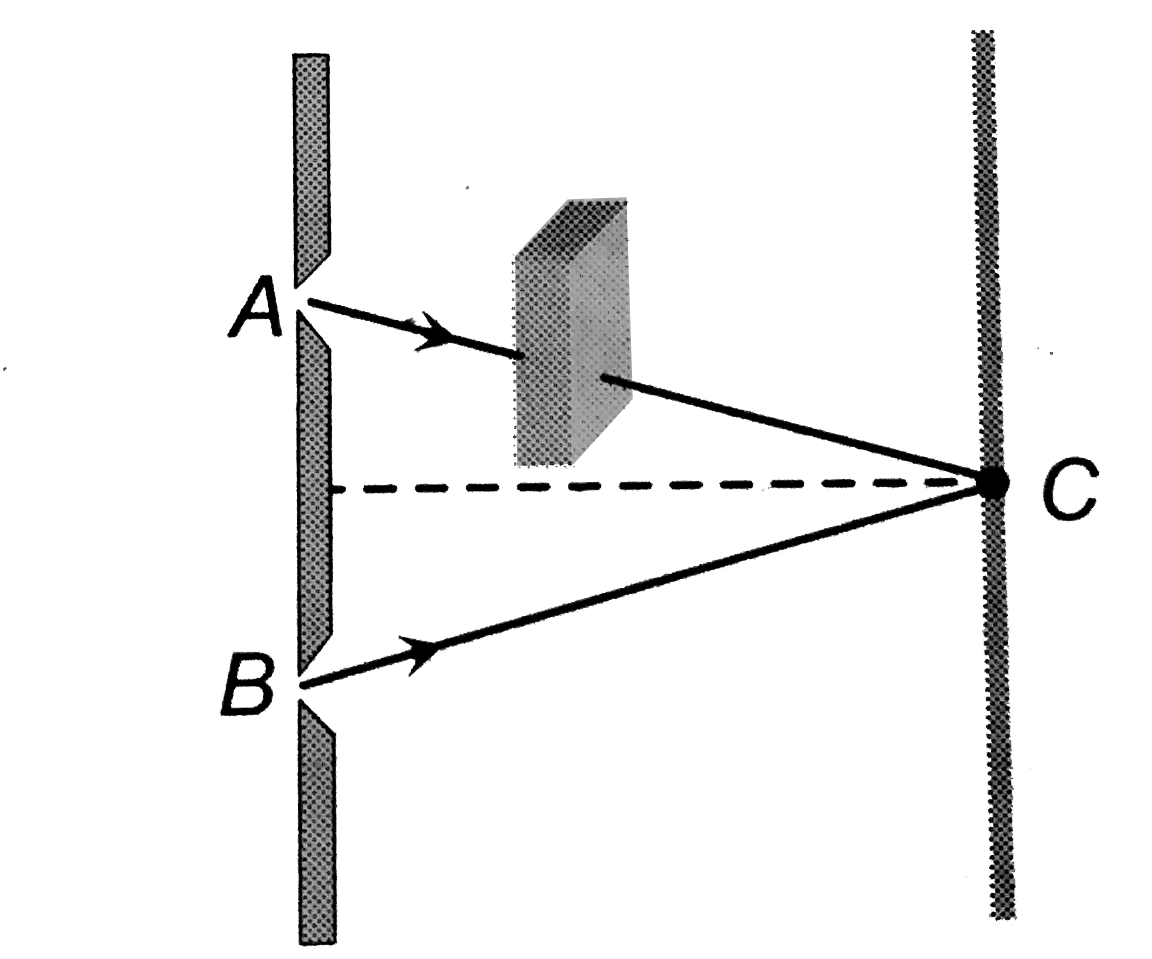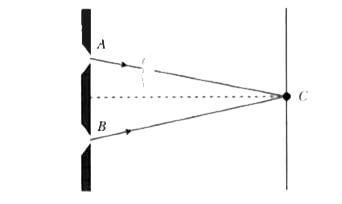A parallel beam of monochromatic light is used in a Young's double slit experiment. The slits are separated by a distance d and the screen is placed parallel to the plane of the slits. Show that if the incident beam makes an angle θ=sin−1(λ2d) with the normal to the plane of the slits, there will be a dark fringe at the centre P_o of the pattern. Solution in Tamil
The correct Answer is:A
The wave fronts reaching O from S1andS2 will have a path difference of S2x
sinθ=S2XS1S2
so, path difference =S2X
=S1S2sinθ
=dsinθ=dxxλ2d=λ2
As the path difference is an odd multiple of λ2 there wil be dark fringe at point P.
Topper's Solved these Questions
Similar Questions
A light wave can travel
View SolutionA concave mirror having a radius of curvature 40 cm is placed in front of an illuminated point source at a distance of 30 cm from it. Find the location of the image.
View SolutionAn alpha particle is projected vertically upward a speed of 3.0X104kms−1 in a region where a magnetic field of magnitude 1.0 T exists in the direction south to north. Find the magnetic force that acts on the a particle.
View SolutionIn Young's experiment, monochromatic light is used to illuminate the two slits A and B. Interference fringes are observed on a screen placed in front of the slits. Now if a thin glass plate is placed normally in the path of the beam coming from the slit

View SolutionMonochromatic light from a narrow slit illuminates two parallel slits producing an interference pattern on a screen. The separation between the two slits is now doubled and the distance between the screen and the slits is reduced to half. The fringe width
View SolutionA parallel beam of monochromatic light of wacelength λ used in a Young's double slit experiment. The siits are separated by a distance d and the screen is placed parallel to the plane of the slits. The incident beam makes an angle θ=sin−1(λ2d) with the normal to the slits. A transparent sheet of refractive index 'μ' and thickness t=λ2(μ−1) is introduced infront of one of the slit. find the intensity at the geometrical centre.
View SolutionUsing monochromatic light of wavelength lamda in Young's double slit experiment, the eleventh dark fringe is obtained on the screen for a phase difference of _____.
View SolutionIn Young's double slit experiment the two slits are d distance apart. Interference pattern is observed on a screen at a distance D from the slits. A dark fringe is observed on the screen directly opposite to one of the slits. The wavelength of light is
View SolutionIn Young's double slit experiment the distance between the slits is d. An interference fringe is obtained on a screen placed at a distance D from the slits . A dark band is noticed just opposite to one of the slits. The wavelength of the light used is
View SolutionS is the size of the slit, d is the separation between the slits and D is the distance of slits from a plane where Young's double slit interference pattern is being observed . If lamda be the wavelength of light, then for sharp fringes, the essential conditional is
View SolutionIn a Young's double slit experiment, the slit separation d is 0.3 mm and the screen distance D is 1 m. A parallel beam of light of wavelength 600 nm is incident on the slits at angle as shown in figure. On the screen, the point O is equidistant from the slits and distance PO is 11.0 mm. Which of the following statement(s) is/are correct ?
View SolutionIn Young's double-slit experiment , d is separation between the slits. Separation between plane of the slits and screen is D. Wavelength of light used is λ. Number of fringes per unit distance on the screen is
View SolutionIn Young's double slit experiment with slit separation d, a monochromatic light of wavelength lamda is used. The angular separation of the fringes is
View SolutionIn Young's experiment, monochromatic light is used to illuminate the two slits A and B. Interference fringes are observed on a screen placed in front of the slits. Now, if a thin glass plate is placed normally in the path of the beam coming from the slit, then

View SolutionA parallel beam of monochromatic light is used in a Young's double slit experiment. The slits are separated by a distance d and the screen is placed parallel to the plane of the slits. If the incident beam makes an angle θ=sin−1(λ2d) with the normal to the plane of the slits, there will be .....at the centre P0 of the pattern.
View SolutionA parallel beam of monochromatic light is used in a Young's double slit experiment. The slits are separated by a distance d and the screen is placed parallel to the plane of the slits. If the incident beam makes an angle θ=sin−1(λ2d) with the normal to the plane of the slits, there will be .....at the centre P0 of the pattern.
View Solution

